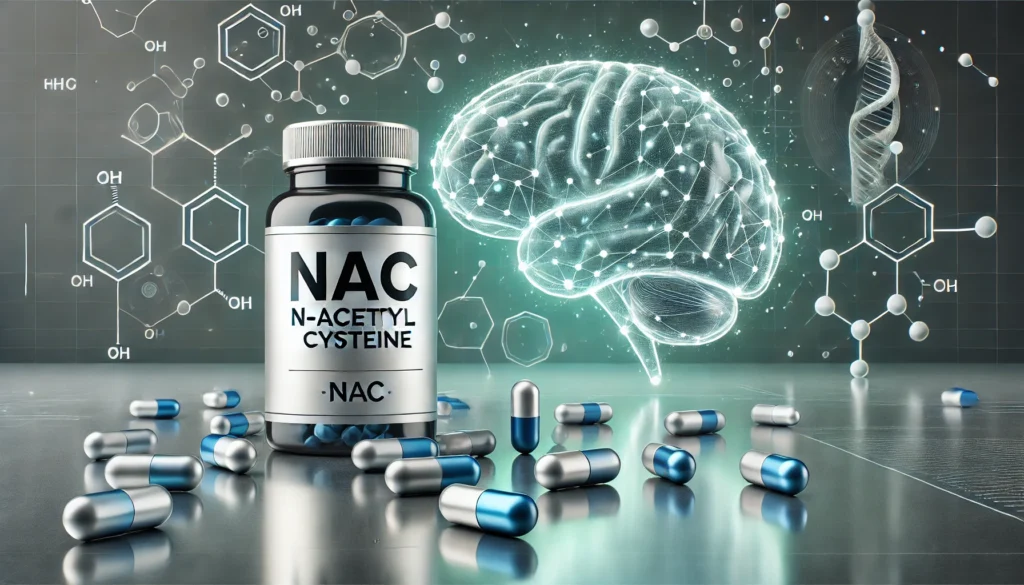N-Acetyl Cysteine (NAC) is a derivative of the amino acid L-cysteine and has gained recognition for its antioxidant properties and potential therapeutic effects. Often used as a supplement, NAC is praised for its role in boosting glutathione levels, managing oxidative stress, and supporting overall health, particularly brain function. Given its antioxidant capabilities, NAC has become increasingly popular in the realm of nootropics, where it is explored for its cognitive benefits and neuroprotective qualities. This article delves into the source, chemistry, physiological mechanisms, potential nootropic benefits, dosing guidelines, side effects, interactions, and safety considerations of NAC.
You May Also Like:
Sources of N-Acetyl Cysteine
NAC is not typically found in natural food sources, as it is a synthetic compound derived from L-cysteine. However, L-cysteine, an amino acid that NAC is derived from, can be obtained through dietary sources, including:
- Animal-based foods: Chicken, turkey, pork, eggs, and dairy products are rich in L-cysteine.
- Plant-based foods: Broccoli, Brussels sprouts, garlic, and oats provide some L-cysteine.
- NAC Supplements: NAC is commonly available in capsule, tablet, and powder form, making it accessible for those seeking higher doses beyond dietary cysteine intake.

Chemistry of N-Acetyl Cysteine
NAC is synthesized by acetylating L-cysteine, creating a more stable and bioavailable form of the amino acid. The presence of an acetyl group improves the compound’s solubility, allowing it to be better absorbed in the body compared to L-cysteine. The chemical structure of NAC allows it to act as a precursor to glutathione, one of the body’s most crucial antioxidants. Glutathione plays a vital role in neutralizing free radicals and protecting cells from oxidative damage. NAC supports this process by providing a readily available sulfur donor, enabling the production of glutathione.
Physiological Mechanisms of N-Acetyl Cysteine in the Body and Brain
NAC primarily exerts its effects through its role in replenishing intracellular glutathione, a critical molecule for cellular detoxification and antioxidant defense. Glutathione helps to reduce oxidative stress, which is implicated in aging, chronic diseases, and neurodegenerative conditions. NAC’s physiological effects extend into the brain, where it is thought to protect neurons from oxidative damage and inflammatory processes that contribute to cognitive decline.
- Glutathione Synthesis: NAC provides cysteine, a limiting factor in glutathione synthesis, making it essential for maintaining cellular redox balance. By boosting glutathione levels, NAC helps counter oxidative stress in tissues with high metabolic activity, such as the brain.
- Antioxidant Defense: Beyond glutathione, NAC has its own antioxidant properties, which help mitigate damage from reactive oxygen species (ROS). This antioxidative effect is especially important in the brain, where oxidative stress is associated with neurodegenerative diseases like Alzheimer’s and Parkinson’s.
- Anti-inflammatory Actions: NAC may modulate neuroinflammation by regulating inflammatory cytokines, which are elevated in various neurological disorders. This anti-inflammatory effect is valuable in maintaining healthy brain function and could potentially mitigate cognitive impairment.
- Neurotransmitter Regulation: NAC has been found to impact the glutamate system, a critical pathway in the brain’s excitatory signaling. By modulating glutamate levels, NAC helps maintain synaptic balance, which is crucial for learning, memory, and overall cognitive health.

Nootropic Benefits of N-Acetyl Cysteine
NAC is increasingly used as a nootropic due to its ability to enhance cognitive function, protect against neuronal damage, and support mood regulation. While not a traditional stimulant, NAC may offer several cognitive benefits through its antioxidative, neuroprotective, and mood-stabilizing properties.
- Cognitive Protection from Oxidative Stress: The brain’s high oxygen demand and lipid-rich composition make it susceptible to oxidative damage, a key factor in cognitive decline. NAC’s ability to replenish glutathione and reduce oxidative stress supports brain health, potentially slowing the progression of neurodegenerative diseases and cognitive aging.
- Mood Stabilization and Reduction of Anxiety: Research suggests that NAC influences glutamate levels in the brain, which may help regulate mood. Some studies have shown NAC’s potential in alleviating symptoms of anxiety, depression, and obsessive-compulsive disorder, potentially due to its regulatory effects on neurotransmitters associated with mood.
- Neuroprotection and Potential for Preventing Neurodegeneration: NAC’s role in reducing oxidative stress and inflammation may protect neurons from degenerative processes that lead to diseases like Alzheimer’s and Parkinson’s. Clinical research is ongoing, but preliminary findings suggest that NAC could play a neuroprotective role and improve the quality of life for those at risk of cognitive decline.
- Enhanced Mental Clarity and Focus: By reducing oxidative damage and maintaining neurotransmitter balance, NAC may enhance mental clarity and focus. Although its cognitive-enhancing effects are subtle compared to stimulants, NAC supports overall brain health, which can lead to improved focus and mental endurance.

Dosage and Supplementation Guidelines
For optimal results, NAC dosing should consider both the user’s health needs and the intended outcomes, as doses may vary for general health, nootropic purposes, and specific therapeutic uses.
- General Health Dosage: For general antioxidant support, doses of 500-600 mg per day are typically effective. This range supports glutathione production without overwhelming the body’s detoxification pathways.
- Nootropic Dosage: For cognitive support and neuroprotection, typical doses range from 600 to 1,200 mg per day, divided into two doses to maintain stable blood levels. This dosage may support focus, memory, and cognitive resilience.
- Clinical and Therapeutic Dosage: Higher doses, up to 2,400 mg per day, have been used under medical supervision for therapeutic purposes, such as in individuals with obsessive-compulsive disorder or neurological conditions. It is essential to consult a healthcare provider before taking such high doses due to potential side effects and interactions.
- Supplement Forms: NAC supplements are available in tablet, capsule, and powder forms. The powder form is suitable for mixing into drinks but has a distinct sulfuric taste. Most users find capsules or tablets more palatable.
Since NAC is relatively well-tolerated, adverse effects are rare but may include mild gastrointestinal discomfort. Due to its sulfur content, NAC can have a slight odor that some users may find unpleasant.
Side Effects and Safety
NAC is generally safe for most individuals; however, high doses may lead to side effects or adverse reactions, particularly in individuals with specific health conditions or those taking certain medications.
- Digestive Issues: Some users experience nausea, vomiting, diarrhea, or abdominal discomfort, particularly at high doses. Taking NAC with food may help alleviate these symptoms.
- Hypotension: NAC can sometimes lower blood pressure, which may cause dizziness or lightheadedness in susceptible individuals, especially those on antihypertensive medications.
- Respiratory and Allergic Reactions: Although rare, allergic reactions may occur, leading to symptoms such as rash, itching, or swelling. Individuals with a history of asthma should exercise caution, as NAC may occasionally exacerbate respiratory symptoms.
- Potential for Interference with Chemotherapy: Due to its potent antioxidant properties, NAC may interfere with the efficacy of certain chemotherapeutic agents that rely on oxidative damage to target cancer cells. Patients undergoing chemotherapy should consult their oncologist before using NAC.

Interactions with Other Supplements and Medications
NAC can interact with various medications and supplements, potentially altering their effects or causing adverse reactions. Here are some of the most common interactions to be aware of:
- Nitroglycerin: NAC may enhance the effects of nitroglycerin, a medication used for chest pain, by increasing blood vessel dilation. This can lead to severe hypotension and dizziness, so these two should not be taken together without medical supervision.
- Antioxidants and Nootropics: Combining NAC with other antioxidants, such as vitamin C or vitamin E, may have synergistic effects. While this combination can be beneficial for oxidative stress management, excessive antioxidant intake can sometimes inhibit physiological oxidative processes, so moderation is advised.
- Medications that Impact Glutamate or Dopamine Levels: Individuals taking medications for psychiatric conditions should exercise caution when taking NAC, as it may alter neurotransmitter levels. NAC may interact with antidepressants, antipsychotics, and other drugs that influence glutamate or dopamine.
- Bronchodilators: NAC is sometimes used as a mucolytic in respiratory medicine, but when taken with certain bronchodilators, it may intensify respiratory secretions. This can be problematic for individuals with specific respiratory conditions, who should seek medical advice before combining these agents.
Risks for Individuals with Certain Health Conditions
NAC supplementation is generally safe, but certain populations should exercise caution or consult a healthcare provider before use.
- Asthma and Respiratory Conditions: Although NAC is sometimes used to manage mucus production, it can exacerbate bronchospasm in some asthmatic individuals. Asthma patients should discuss NAC with their physician before use.
- Kidney and Liver Disease: Since the kidneys are responsible for excreting NAC, those with renal impairment should avoid high doses. Similarly, individuals with liver disease should consult their healthcare provider, as NAC is metabolized in the liver, and excessive doses may exacerbate hepatic stress.
- Pregnant and Nursing Women: Limited research exists on the effects of NAC supplementation during pregnancy or breastfeeding. While generally safe at low doses, high-dose NAC should be avoided unless medically indicated and supervised.
A Promising Nootropic for Cognitive and Neuroprotective Support
N-Acetyl Cysteine is a powerful amino acid derivative recognized for its antioxidant, anti-inflammatory, and neuroprotective effects, making it a valuable nootropic supplement. By enhancing glutathione production and mitigating oxidative stress, NAC supports brain health and may slow cognitive decline, improve mental clarity, and stabilize mood. Research suggests that its ability to cross the blood-brain barrier further amplifies its neuroprotective benefits, especially in conditions related to oxidative damage. Beyond its effects on cognition, NAC may also aid in regulating neurotransmitters like dopamine, which are essential for mood and emotional balance. While it is generally safe, those considering NAC should follow recommended dosage guidelines and be aware of potential interactions, particularly if taking medications for mental health or respiratory conditions. Overall, NAC presents promising cognitive benefits and may play an important role in supporting long-term brain health.

References:
- N-Acetylcysteine – Purported Benefits, Side Effects, and More. Retrieved from: https://www.mskcc.org/cancer-care/integrative-medicine/herbs/n-acetylcysteine
- What are the Health Benefits of NAC (N-Acetyl Cysteine)? Retrieved from: https://www.healthline.com/nutrition/nac-benefits
- A Review on Various Uses of N-Acetyl Cysteine. Retrieved from: https://pmc.ncbi.nlm.nih.gov/articles/PMC5241507/
- Health Benefits of NAC. Retrieved from: https://www.webmd.com/diet/health-benefits-nac
- What are the benefits of NAC (N-acetylcysteine)? Retrieved from: https://www.medicalnewstoday.com/articles/327219#_noHeaderPrefixedContent
- N-Acetylcysteine and Its Immunomodulatory Properties in Humans and Domesticated Animals. Retrieved from: https://www.mdpi.com/2076-3921/12/10/1867
Important Note: The information contained in this article is for general informational purposes only, and should not be construed as health or medical advice, nor is it intended to diagnose, prevent, treat, or cure any disease or health condition. Before embarking on any diet, fitness regimen, or program of nutritional supplementation, it is advisable to consult your healthcare professional in order to determine its safety and probable efficacy in terms of your individual state of health.
Regarding Nutritional Supplements Or Other Non-Prescription Health Products: If any nutritional supplements or other non-prescription health products are mentioned in the foregoing article, any claims or statements made about them have not been evaluated by the U.S. Food and Drug Administration, and such nutritional supplements or other health products are not intended to diagnose, treat, cure, or prevent any disease.
TAGS
N-acetyl cysteine, nootropic supplement, amino acid, antioxidant, anti-inflammatory, neuroprotective, cognitive health, mood regulation, reduce anxiety, mental clarity, focus


